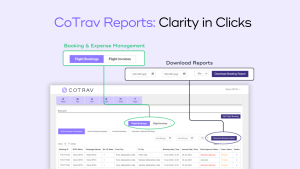Have you ever looked at a global travel agency and thought—”They’ve got it all figured out”?
Smart tech. Polished dashboards. Round-the-clock support.
But as a CXO of your company, you have multiple variables to take into account while deciding a solution for your business. Especially a solution that manages your business travel.
The variables would be something that is related to you and how your business manages travel or where your business is located?
It feels like a no-brainer if you want a smarter tech; that’s globally adapted by most of the businesses across the world.
As they have something that’s they figured out, that’s standardized, or adaptable by the global companies.
But, the next questions that you must ask yourself while deciding that if you are going for a global company or an Indian company would be
- Are their offices in the reachable range?
- Would they adapt according to your company policies?
- Are they okay with the billing cycle of your company? Or the invoice structure?
- Are their invoices GST and TDS compliant?
If you ask these questions, and while finding the answers of those questions you must know that not necessarily that the solution that works in New York will work similarly well in a company located in Lucknow.
So if you’ve been wondering, what if a perfect one-fit-all-solution provided by a global agency might not be the right solution for your Indian Startup or business. This blog would be for you.
Following are the points you must consider while deciding if you go for a global travel agency or an Indian Grown Travel Management Company or solution.
What Looks Seamless Globally Can Be a Struggle Locally
You might think: “Is there really that much difference?”
Yes. A global travel agency might be built for scale, but not always for you—your team, your city, your business.
Let’s take a closer look.
1. Pricing and Cost Sensitivity
When we talk about the pricing models followed by global companies, MNCs, or overseas firms, you’ll notice a pattern—and that’s standardisation in pricing.
Pre-paying Is the Thing for Global Companies
They typically use a standard model, which often includes:
- Subscription fee model
- Prepaid corporate cards
Most global travel agency work on these two models, which usually depend on the idea that companies pay before the services are used.
But That’s Not How Indian Companies Work
These models don’t align with what many Indian companies expect.
Indian businesses usually don’t prefer pre-payment. Instead, they often require a single bill-to-company invoicing structure-something that includes consolidated billing and a unified expense management solution, rather than individual billing.
You might be that company.
You probably rely on post-travel invoicing, GST-compliant billing, and the flexibility to make last-minute changes without incurring unreasonable costs.
This model also supports better cash flow management and a stable credit-based billing system when it comes to business travel.
Indian companies are also quite price-sensitive. And global systems weren’t built with this rhythm in mind.
That’s where local travel partners truly add value—with bundled deals, post-paid options, and tax-smart invoicing that fits how you actually work.
2. Localized Service and Support
When we talk about travel support from global agencies, the promise usually sounds impressive- 24×7 helplines, dedicated support teams, and instant resolutions.
But once you look closer, you’ll notice a common pattern:
It’s centralized. It’s standardized. And it’s often far removed from your reality.
You don’t just need support that’s always on, you need support that’s always relevant.
Here’s what you should consider:
Support That Understands Your Reality
- Global travel agencies often run centralized systems that follow a standard process.
- Their support may not be aligned with your working hours or the way Indian companies operate.
- You might get chatbot responses, IVR menus, or delayed replies from teams in different time zones.
- Communication is usually in English only, which limits comfort and clarity in real-time problem-solving.
What Indian TMCs Offer Instead
- Local presence: Offices and teams that are reachable across India.
- Human-first approach: Real-time, live support—no bots, no delays.
- Regional language support: Speak in a language you’re comfortable with.
- Dedicated relationship managers (RMs): One point of contact who knows your business inside out.
- Faster issue resolution: Immediate response and local coordination without ticket escalation.
When your teams travel, you need a partner who understands the local context and can act immediately—without waiting for escalations or struggling with communication gaps.
That’s where Indian travel partners give you an advantage.
They don’t just offer support—they offer relevant, real-time support that fits the way you work.
3. Regulatory Compliance and Policies
Let’s talk about what happens after your team travels.
Booking the trip is just the beginning what really matters is how you handle everything afterward. The bills, the reimbursements, the tax documents. And if you’re running an Indian business, chances are- you don’t do it all upfront.
You probably work on a post-trip model. You might book the trip using a company wallet or a cash advance. Maybe your employee pays and submits the invoice later. Either way, your finance team reviews the travel afterward because that gives you control.
And honestly, that works for you.
But here’s where things get a little out of sync.
Global travel platforms?
Global travel agencies usually follow a different process:
- They expect prepaid bookings
- You’re asked to use corporate cards or fixed subscriptions
- Everything is structured and settled before the trip even begins
Now, this model works fine in markets where it was designed. But in India, it doesn’t always match your process or preferences.
What you really need is flexibility—and global platforms don’t always offer that.
Compliance Isn’t Just a Feature—It’s a Requirement
Your business doesn’t just need clean invoices—you need compliant ones.
Here’s where global platforms often fall short:
- They may not support GST or TDS-compliant invoicing
- Input Tax Credit (ITC) claims become difficult
- You may have to fix formats manually
- You end up explaining your internal policies repeatedly
And let’s face it—global helpdesks aren’t familiar with Indian tax rules. It’s not their fault; it’s just not part of their system.
How Indian TMCs Handle It Better
Now compare that with an Indian travel partner.
They understand how Indian finance teams work because they’re built for it.
You get:
- Post-paid billing that supports your cash flow
- GST and TDS-compliant invoices
- Support for cash advances, wallets, and reimbursements
- Invoices that are already ready for audit
- No need to explain your process again and again
They know the Indian tax system, the formats you need, and how to ensure compliance from day one.
Your travel platform should fit naturally into your workflow. It shouldn’t create extra work for your team.
And most importantly, it should help you stay compliant without stress.
You shouldn’t have to:
- Chase down invoices
- Reformat tax details
- Or explain billing cycles to someone in a different country
Staying compliant should feel easy. Not like a challenge.
It should feel like something that just works—because that’s how business travel should be.
4. Technology and Booking Tools
Global travel platforms look impressive.
They come with clean dashboards, automated approvals, and tightly controlled workflows. For companies where travel mostly means booking a flight and hotel, and everything is paid through a corporate card, these systems work well.
But if you’re running travel for an Indian company, you know that’s rarely the full picture.
Indian business travel often involves more than just booking flights.
You might also need to:
- Book train tickets through IRCTC
- Arrange regional bus travel or intercity cabs
- Coordinate with local cab operators directly
- Handle multi-level approval workflows some of which may still be manual or offline
That’s where global platforms start to feel limiting.
They don’t always show India-specific content. They may not connect with your internal tools. And they often expect your team to adapt to their rigid process which doesn’t always match how you work.
This is where Indian platforms have an edge.
They’re built with your everyday challenges in mind. Whether it’s GST invoicing, language flexibility, or multi-mode travel bookings these tools are designed to work the way Indian businesses already operate. Even the approval workflows are tailored to match how your teams move.
So while global platforms bring strong technology, they’re not always ready for the unique demands of Indian travel. You don’t just need automation- you need context.
You need a system that understands your routes, your payment preferences, and your team’s way of working.
And that’s what the right local platform delivers—tech that’s not just powerful, but practical.
So, What’s a Better Way to Travel?
You need a partner who combines structure with sensitivity. Automation with empathy. Tech with local touch.
That’s where CoTrav fits in.
The Travel Partner That Truly Fits the Way You Work
You’ve seen how global travel agency platforms can fall short—rigid billing systems, limited local support, and workflows that don’t match how your business operates.
That’s where CoTrav fits right in.
Built for Indian businesses like yours, CoTrav understands your real-world needs—not just in theory, but in practice.
With CoTrav, you get:
- Post-paid billing that supports your cash flow
- GST and TDS-compliant invoices that are audit-ready
- Train, bus, cab, and flight bookings all in one place—yes, including IRCTC
- Real-time human support that knows your cities, vendors, and emergencies
- Flexible approval workflows that match your existing process—not force you into a new one
You don’t need to adjust to a one-size-fits-all system.
You deserve a solution that truly understands how Indian businesses actually travel.
In other words, with CoTrav, you’re not just booking trips—you’re managing business travel with control, comfort, and complete compliance.
Conclusion
At the end of the day, it’s not just about booking flights or managing approvals—it’s about finding a travel solution that understands how you work.
Global travel agency may offer great tech, but they often miss the nuances that matter here in India like post-trip billing, GST-ready invoicing, real-time human support, and the flexibility your teams actually need.
That’s where a local partner like CoTrav makes all the difference.
After all, we’re built for Indian businesses—designed to fit into your systems, support your travel needs, and simplify your processes without asking you to change the way you work.
So if you’re ready to experience travel management that truly fits you, let’s connect.
Book a demo with CoTrav and see how simple business travel can really be.
FAQs
Q1. Are global travel agencies a bad fit for Indian companies?
Not bad—but their models often don’t align with Indian billing cycles, tax norms, or approval flows. Local partners simply understand how Indian businesses actually operate.
Q2. Can local TMCs handle manual approvals and custom workflows?
Yes. In fact, they work with your current process—no need to change how you already function. As a result, you get less friction, fewer delays, and smoother coordination.
Q3. Do Indian platforms support international travel too?
Absolutely. Local TMCs like CoTrav manage both domestic and global trips.And they still offer India-specific perks like GST invoicing and local support.
Q4. What if we need trains, buses, and cabs too?
Local partners cover all modes—trains, intercity cabs, and regional buses. They also connect with IRCTC and local operators that global tools often miss.
Q5. Why prefer post-travel billing?
It helps with cash flow and avoids prepayment complications. Plus, it fits the reimbursement models most Indian companies follow.
Q6. Is CoTrav support real-time and human?
Yes. No bots or delayed tickets, just real people who know what to do. They speak your language and solve issues when they actually happen.
Q7. Can I save money with a local partner?
Yes, through tax benefits, better-negotiated local rates, and flexible billing.It’s not just cheaper upfront it’s smarter long-term.




